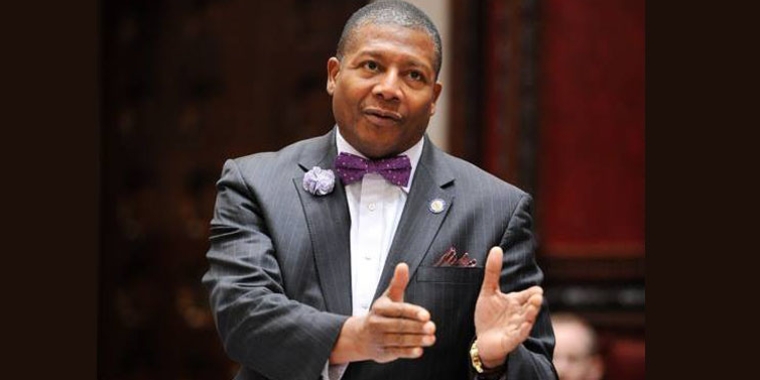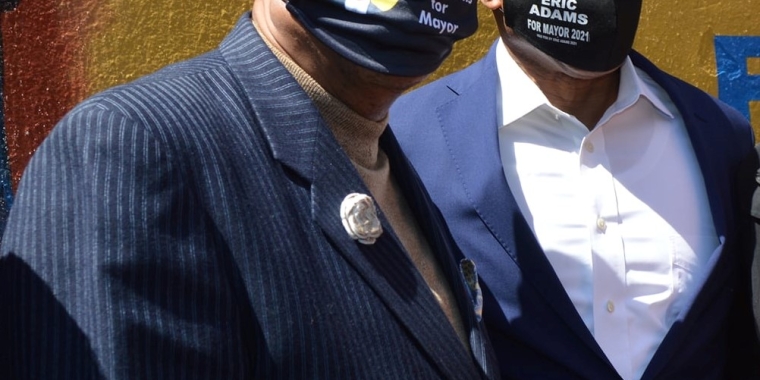
Senator James Sanders Jr. and the Senate Majority Pass Fiscal Year 2024 Budget
May 17, 2023
-
ISSUE:
- 2024 budget


Senator James Sanders Jr. and the Senate Majority Pass Fiscal Year 2024 Budget:
One month after the April 1st budget deadline, Senator Sanders and the New York State Democratic Majority passed the fiscal year 2024 New York State Budget. One that will prove to be beneficial in several areas for New Yorkers. This year’s budget increased by about $8.5 billion compared to the 2023 fiscal year’s budget. With provisions made towards advancing education, combatting climate change, expanding access to health care including mental health resources, addressing housing and public safety, investing in transportation infrastructure and several others, the fiscal year of 2024 is focused on a better, more affordable New York for all.
The approved budget does a great job of establishing a level of priority around the topics that have been pressing to New Yorkers throughout the state. However, while the budget has prioritized several actions that will prove to be beneficial across the state, there are a few areas where it fell short or needs improvement.
THE GOOD
Environmental Protections
· Allocating $400 million for capital projects that work to protect the environment through the Environmental Protection Fund. This includes environmental justice, municipal parks and recycling, and land acquisition.
· Includes $500 million for the Clean Water and Infrastructure Act.
· Requiring Building and Energy codes to prohibit the installation of fossil-fuel equipment and building systems starting December 31, 2025.
Education
· Fully funding Foundation Aid for public schools K-12 for the first time with a $34.5 billion budget.
· $135 million to cover school meals.
· Halting any increases to in-state tuition across SUNY and CUNY, as well as allocating an additional $103 million to each for general operational aid and to assist in upholding transformational initiatives.
Healthcare
· A $1 billion investment in mental health resources and services.
· $100.7 million towards reproductive freedoms by expanding access to abortion care and over-the-counter contraception with an emphasis on SUNY and CUNY students.
· $1 billion towards revitalizing Medicaid or more than 7.8 million low-income New Yorkers
· Supporting New Yorkers with disabilities and providing additional aid to distressed providers.
Economic Development & Small Businesses
· Raising the budget to $2 million in support of Minority and Women-Owned Business Enterprises.
· $10 million to support the establishment of farm markets and supermarkets in underserved communities.
· $12 million in Legislative Grants for businesses.
Working People & Families
· Expanding the Child Care Tax Credit to families with children ages zero to four, opening up this tax credit to 584,000 more households.
· Allocating $500 million towards the Workforce Retention Grant Program and $25 million towards the Employer Child Care Tax Credit.
· The budget enables the lowest personal income tax rates that the state has seen in the last 70 years.
Transportation
· Via the Payroll Mobility Tax on the largest businesses in the state, $1.1 billion will be allocated annually to the MTA to transform transit infrastructure.
· The proposed MTA fare increase will be reduced as a result of the budget.
· An additional $120 million was given to improve rural roadways including the upstate STOA, CHIPS, and State Touring Routes.
Housing
· $391 million won towards funding COVID-era arrears for NYCHA, Section 8 tenants, private tenants, and other public housing authorities.
· $40 million for the Homeowner Protections Program, $25 million for a First-Time Homeowners Program, and $10 million for Land Banks.
Public Safety
· $347 million towards evidence-based gun violence reduction programs.
· $30 million will be allocated to combatting hate crimes and Anti-AAPI violence.
· In order to aid prosecutors and defenders as well as helping to fund prosecution and defense across the state, approximately $252 million was allocated to these areas.
THE BAD
· Taxes were not increased highest income earners in New York, a step that would have helped to address economic inequality.
· Did not increase the Minority- and Women Owned Business Enterprises (MWBEs) discretionary purchasing thresholds for New York City as well as the State, this would have increased the amount of government contracts awarded to MWBEs.
· Did not include funding for a study or an upgrade to Brookville Road (“Snake Road”) to address flood mitigation and safety.
NEEDS WORK
· Although the NYC minimum wage was increased to $17 an hour by 2026 from the current rate of $15 with future increases linked to the cost of living index, a raise to $21.25 by 2027 would have been more reasonable.
Share this Article or Press Release
Newsroom
Go to Newsroom
Homeowner Assistance Fund Emergency Assistance for Homeowners
November 30, 2021

Senator Sanders 2021 Veteran Hall of Fame
November 11, 2021
